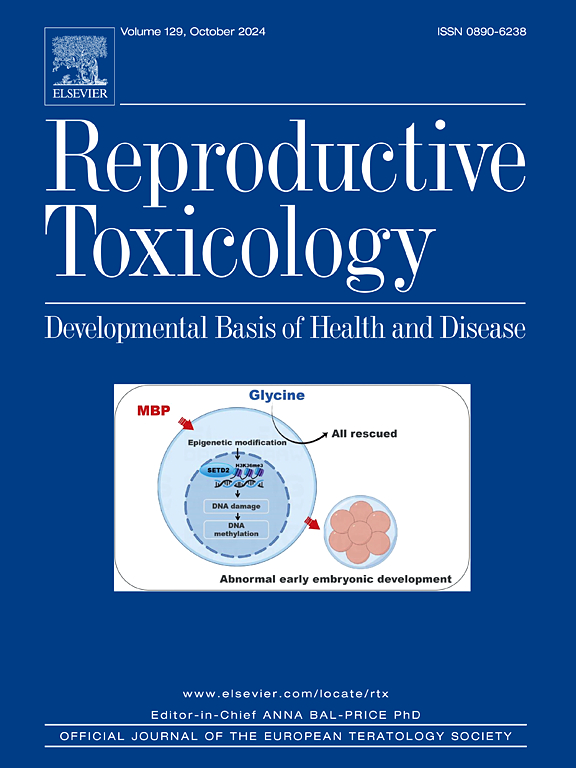母体暴露于尼古丁会引起成年大鼠后代卵巢的氧化应激和炎症变化。
IF 3.3
4区 医学
Q2 REPRODUCTIVE BIOLOGY
引用次数: 0
摘要
尼古丁是香烟中毒性最大的物质之一,但也存在于嚼烟胶、烟草贴片和电子烟产品中。除了是一种极易上瘾的化学物质外,它还能降低男性和女性的生育能力。在卵巢中,它可以引起形态变化并损害卵泡的形成,这可能是母亲在怀孕期间吸烟的妇女生殖周期改变和更年期预期的一个原因。尼古丁通过增加自由基的生成,诱导生物样品氧化,改变炎症因子的表达。它会破坏免疫系统和新生儿在产前暴露的许多其他细胞。尽管有致畸的可能,许多妇女在怀孕和哺乳期间继续使用这种药物。因此,本研究旨在分析母体暴露于尼古丁对成年大鼠卵巢的影响。为此,10只大鼠在怀孕和哺乳期间接受尼古丁治疗。他们的后代在90天大的时候被安乐死,在月经期,用于卵巢收集和氧化应激和炎症分析。结果表明,暴露于尼古丁增加了丙二醛水平,但没有引起卵巢细胞DNA (8-OHdG)的损伤。增加IL-1β、抗炎蛋白AnxA1和受体Fpr1,减少卵巢肥大细胞数量。我们得出的结论是,母体暴露于尼古丁能够诱导氧化应激,并导致在宫内和母乳喂养阶段暴露的成年后代卵巢发生炎症变化。本文章由计算机程序翻译,如有差异,请以英文原文为准。
Maternal exposure to nicotine causes oxidative stress and inflammatory changes in the ovaries of rats’ adult offspring
Nicotine is one of the most toxic substances found in cigarettes, but also found in chewing tobacco gum, patches and vaping products (electronic cigarettes). In addition to being a highly addictive chemical, it is capable of reducing fertility in men and women. In the ovaries, it can induce morphological changes and impair the formation of follicles, being a possible cause of changes in the reproductive cycle and anticipation of menopause in women whose mothers smoked during pregnancy. By increasing the generation of free radicals, nicotine can induce oxidation in biological samples and change the expression of inflammatory cytokines. It damages the immune system and many other cells of newborns exposed prenatally. Despite its teratogenic potential, many women continue to use this drug during pregnancy and lactation. Thus, this work aims to analyze the effects of maternal exposure to nicotine on the ovaries of adult rats. To this end, 10 rats received nicotine throughout pregnancy and lactation. Their offspring were euthanized around 90 days-old, in the metestrus phase, for ovary collection and analysis of oxidative stress and inflammation. The results showed that exposure to nicotine increased MDA level, but did not cause damage to the DNA of ovarian cells (8-OHdG). It also increased IL-1β and anti-inflammatory protein AnxA1 and receptor Fpr1, and reduced the mast cell population in ovaries. We concluded that maternal exposure to nicotine is capable of inducing oxidative stress and leading to inflammatory changes in the ovaries of adult offspring exposed during the intrauterine and breastfeeding phases.
求助全文
通过发布文献求助,成功后即可免费获取论文全文。
去求助
来源期刊

Reproductive toxicology
生物-毒理学
CiteScore
6.50
自引率
3.00%
发文量
131
审稿时长
45 days
期刊介绍:
Drawing from a large number of disciplines, Reproductive Toxicology publishes timely, original research on the influence of chemical and physical agents on reproduction. Written by and for obstetricians, pediatricians, embryologists, teratologists, geneticists, toxicologists, andrologists, and others interested in detecting potential reproductive hazards, the journal is a forum for communication among researchers and practitioners. Articles focus on the application of in vitro, animal and clinical research to the practice of clinical medicine.
All aspects of reproduction are within the scope of Reproductive Toxicology, including the formation and maturation of male and female gametes, sexual function, the events surrounding the fusion of gametes and the development of the fertilized ovum, nourishment and transport of the conceptus within the genital tract, implantation, embryogenesis, intrauterine growth, placentation and placental function, parturition, lactation and neonatal survival. Adverse reproductive effects in males will be considered as significant as adverse effects occurring in females. To provide a balanced presentation of approaches, equal emphasis will be given to clinical and animal or in vitro work. Typical end points that will be studied by contributors include infertility, sexual dysfunction, spontaneous abortion, malformations, abnormal histogenesis, stillbirth, intrauterine growth retardation, prematurity, behavioral abnormalities, and perinatal mortality.
 求助内容:
求助内容: 应助结果提醒方式:
应助结果提醒方式:


